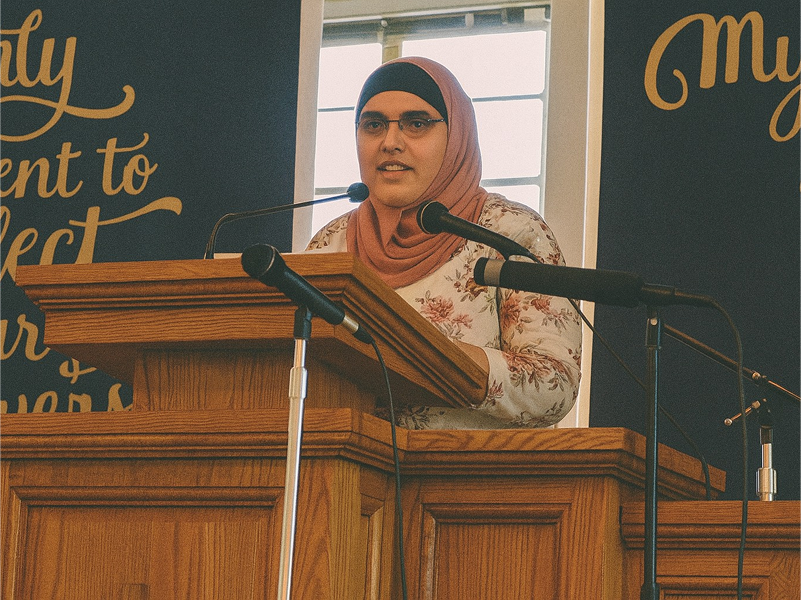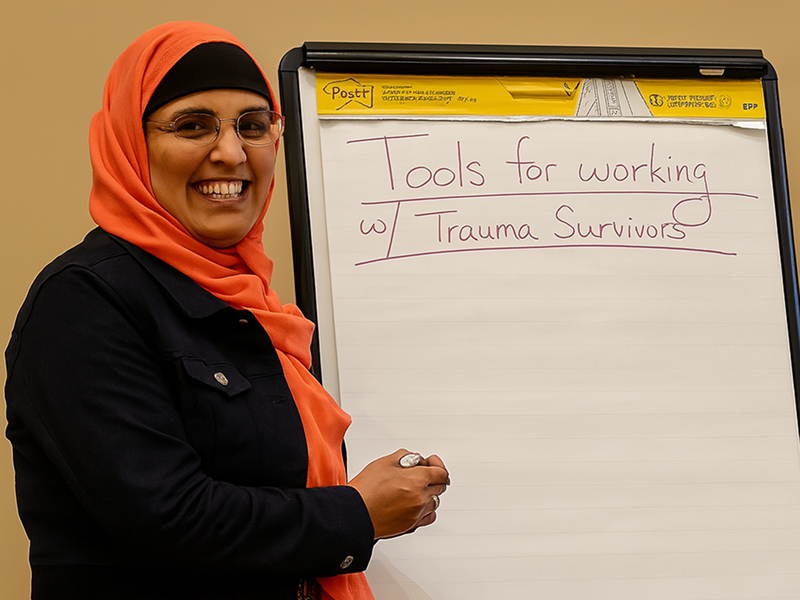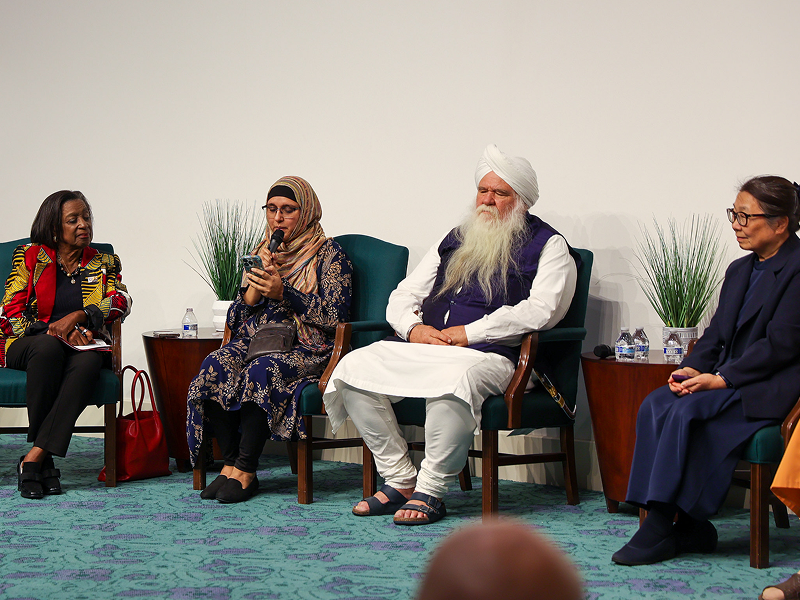Samia Bano is many things–first and foremost, a devout Muslim and a Happiness Expert. She is also a business owner, coach, trainer and author. And a survivor of childhood sexual abuse.
At the age of eight, she was sexually abused by a distant relative, a man whom the family trusted.
Fast forward to her days as a psychology major at UCLA. She began thinking about establishing a school for women who had been abused. She or others would teach subjects such as self-defense, emotional intelligence and abuse prevention.
In 2012, Samia established The Academy of Thriving, an online training and coaching business focused on promoting the mental wellbeing of female survivors of abuse.
Luckily it was the Digital Age. From the outset she was able to coach and train her clients online. She also conducts frequent interviews for her podcast, Make Change Fun and Easy, hosted on The Academy of Thriving website.
Samia employs a consultant to assist her with design, podcasts and other digital needs.
Not long ago, Samia’s passion for uplifting survivors of abuse inspired her to write the book Make Change Fun and Easy: How To Create Inner Peace to World Peace in 3 Simple Steps.
Samia speaks at events, explaining the steps female abuse survivors can take not only to recover from the consequences of their abuse but also, eventually, to thrive.
Samia serves as chair of the Culver City Equity and Human Relations Advisory Board. She supports the vision of the city council: to promote equity and positive human relations. She has served on this committee pro bono since 2020.
AS A LITTLE GIRL GROWING UP IN INDIA, YOU WERE SEXUALLY ABUSED. YOUR WORLD WAS TURNED UPSIDE DOWN. WHAT WERE SOME OF THE IMPACTS OF THE ABUSE YOU EXPERIENCED?
I had been a talkative, outgoing child, but I became withdrawn. Silent. I was very confused about what happened. Part of me felt something wrong had happened.
But also part of me, my body, had felt pleasure. It caused a lot of guilt and shame. I was not able to talk to anyone about what had happened for over 10 years. It was a secret. (It’s fairly normal for victims of abuse not to talk about it for many years. Some, never.)
WHAT WAS IT LIKE TO BE A TEENAGER?
I didn’t have any friends. I deliberately wore very baggy, old, unattractive clothes because I didn’t want anyone paying attention to my body.
I was obsessed with my own sense of suffering. Many everyday occurrences would trigger negative thoughts, memories and feelings. For example, I was sensitive to how people touched me, which triggered memories, which led to “I don’t feel safe. I hate this. Why did this person touch me? Why did that person abuse me?” I felt sadness, depression, guilt, anger.
I had no concept of sexual abuse until about 14 when I read a magazine article about childhood sexual abuse written by a psychologist. I said to myself, “I think this is what happened to me.” This was my first glimmer of understanding. It’s why I chose to study psychology, first at Santa Monica College, then at UCLA.

“Allowing myself to ask for help changed my life.”
WHEN DID YOU RECEIVE PSYCHOLOGICAL HELP?
By the time I was 19 I was desperate for help. I couldn’t stand my trauma anymore. Luckily my family had moved to America and I had started college at Santa Monica College. I found out that I could go to an SMC counselor, talk about whatever I wanted, and they would keep it confidential. Allowing myself to ask for help changed my life.
My counselor’s name was Elizabeth. She mainly listened in a very compassionate way and gave me the validation and emotional support I needed. Sometimes, I said to her, ‘I have this problem and I believe this is the solution.’ She would reflect back what I said, and I felt so heard, understood and validated. I saw her several times that semester, but then I didn’t go back. I was doing other things to help myself and making really good progress.
WHAT DID YOU LEARN FROM ELIZABETH?
One of the most important things I learned: It’s a common experience for survivors to feel they’re going crazy. Know that there’s nothing wrong with you. What you’re feeling is very normal given the trauma you’ve been through. You are doing your best with what you know and what you have. Don’t put pressure on yourself to solve the problem right away, or all by yourself.
AFTER GRADUATING FROM UCLA, YOU BEGAN PREPARING TO CREATE YOUR SCHOOL, THE ACADEMY OF THRIVING. WHAT STEPS DID YOU TAKE?
I asked myself what I needed to learn and then started taking classes and workshops.
I also volunteered with Peace Over Violence (POV) and took nearly every training they offered. With them, I trained to become a self-defense instructor focused on survivors of abuse. For example, being in certain physical postures can be triggering for survivors. I learned to cater to their specific issues and needs, such as expressing anger in a healthy way.
I trained and then volunteered as a POV crisis intervention counselor on their sexual assault and domestic violence hotline.I did their “Voices Over Violence” training to learn how to publicly share my own story of surviving violence and use it as an educational tool.
YOUR MAIN GOAL IN CREATING THE ACADEMY OF THRIVING WAS TO HELP PEOPLE TAKE CONTROL OF THEIR OWN WELLBEING AND HAPPINESS. WHAT DOES THAT MEAN?
To be truly in control of your happiness means you have the ability to choose to be happy regardless of circumstances. You’re able to create a life of ever-expanding inner peace, purpose and prosperity for yourself and others. You can do this by learning to take control of how you think, feel and act.
YOU ARE A TRAINER AND COACH, NOT A THERAPIST. YOU TAKE SURVIVORS FROM ANGUISH TO JOY. HOW?
Training is about teaching people the right knowledge and the skills they need to take control of their mental health and happiness. Coaching provides the structures of support and accountability we need to take action. I become a part of my client’s team and give them what I term “ruthless compassion,” so they stay focused and actually implement what they are learning. This way they see actual tangible changes in their lives and start growing happier.

“I strive to live with joy and gratitude every moment.”
YOUR KEY BELIEFS ARE BASED ON BOTH YOUR “LIVED EXPERIENCE” AND SCIENTIFIC RESEARCH. WHAT ARE THE STEPS YOUR CLIENTS TAKE ALONG THEIR JOURNEY?
The 3 steps to happiness are: Stop (the problem), Heal and Grow. Stopping the problem means to stabilize your condition and prevent it from growing any worse. What this is depends on the context. If you’re currently experiencing abuse, it may mean getting yourself out of the abusive environment.
Healing is about repairing and rebuilding. Often survivors of abuse lose their self esteem. You may find it difficult to trust yourself and others. You need to regain this and more to feel whole again.
Growing means going beyond recovery to a place of thriving where you are even better off than you were prior to your experience of trauma. For me, recovery meant finally feeling calm and peaceful in my life again, at least most of the time. Then I started to aim higher. Now I strive to live with joy and gratitude every moment. And I have healthier, happier relationships than I ever did in the past.
GOING BACK TO YOUR COLLEGE DAYS, WHAT WAS COLLEGE LIKE FOR YOU?
I wanted to learn anything that could help me help myself. I found college to be a stimulating environment. I loved it. It allowed me to get out of my own head and focus on something other than my trauma.
I also got actively involved in various clubs and organizations on campus. One of the most relevant was “The Clothesline Project.” It was a student club on campus with the mission to create spaces for people to air their dirty laundry, particularly on the topic of sexual abuse.
In society our own abuse can become a dirty secret. That secret is a huge burden on our hearts and soul and keeps us trapped in chains of fear. For the first so many months of attending the club meetings I just listened to the other survivors share their stories. I realized that I am not the only one who has experienced this kind of trauma (which is a common feeling or thought among survivors). It was also easier to receive self-help advice from my peers that I could see had “been there and done that”.

“It was also easier to receive self-help advice from my peers.”
WHAT CAN YOU SAY ABOUT YOUR ABUSER AND ABUSE?
It’s most often the people you trust who abuse you. It’s OK to stand up for yourself even if it’s someone you’re supposed to love or is supposed to love you. It’s OK to do whatever you need to do to take care of yourself.
My parents did everything they could to protect us against strangers. But my mother and father never taught me to protect myself from a member of my extended family who was loved and trusted by everyone in the family. Eighty percent of child abuse is committed by someone who is known and trusted by the family.
WHAT WAS IT LIKE TO TELL YOUR PARENTS?
One of my deepest fears had been that my family would not believe me or be able to love me once they found out. After all, I had spent years blaming and hating myself.
Eventually, when I was around 30 years old, I told my mother and father. I actually wrote them a letter expressing everything I wanted to say to them. They were shocked. But they believed me and continue to love me.
I IMAGINE THAT PRACTICING ISLAM HAS HELPED YOU TO GO BEYOND YOUR PAIN. IS THIS CORRECT?
Yes. As a kid, I had taken my Muslim identity for granted. I never questioned what I was taught. Never made any effort to deepen my engagement with Islam. At 14, I was starting to struggle with my mental health. Looking for something that would help me. One of the only sources of help that seemed open to me was to learn what Islam had to teach us about being peaceful. So I got myself an English translation of the Quran. I read through it and also started studying Quranic commentary and other books on Islam. I didn’t have any in-person teacher or mentor. My goal was to learn all the rules to being a good Muslim and follow them diligently so that I would feel at peace.
One of the most important practices that is emphasized in Islam is to seek help in prayer, including ritual prayer. I started praying five times a day, just as prescribed. Even when I was feeling down, I would make sure I prayed. This approach helped a little bit. It gave me a sense of purpose. It gave my day structure and me a sense of discipline, which was empowering.
TODAY, HOW DOES BEING AN OBSERVANT MUSLIM HELP YOU TO BE HAPPY AND THRIVE?
I have learned to live Islam at a far deeper level which urges me to love for others what I love for myself, and in that context, to strive for justice and positive social change. Helping others makes me feel joyful and fills my life with so many blessings. And most importantly, I have learned to prioritize my relationship with God over the performance of any behaviors. With the focus on my relationship, my attitude towards God, when I pray, or do anything else for the sake of God, I feel more peaceful, more happy, and I am able to sustain those feelings better. My goal is to do everything in a prayerful manner, to make the relationship with God closer, more loving. This approach to living Islam is allowing me to be happy and thrive to my utmost.